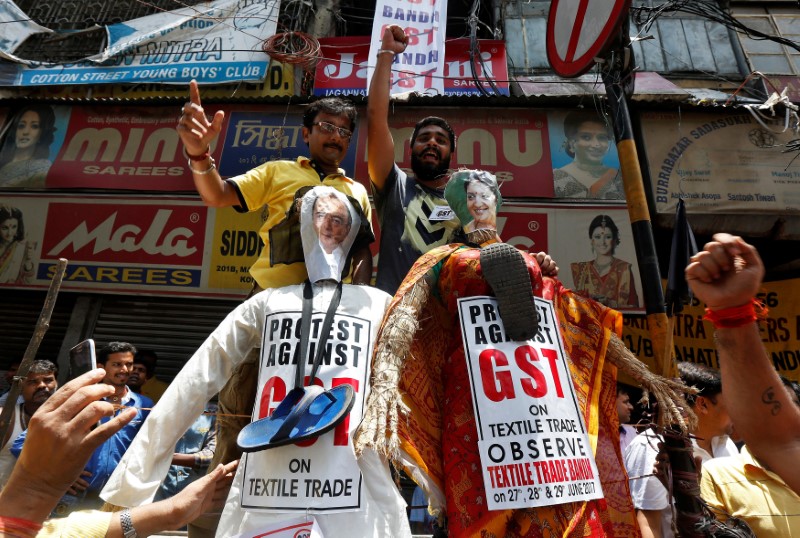By Rajesh Kumar Singh and Manoj Kumar
NEW DELHI (Reuters) - Rakesh Sachdeva sells auto parts in a busy market in central Delhi, just a few miles from Prime Minister Narendra Modi's office. Yet despite having a flourishing business he does not pay any tax.
Until now, his rundown premises and small scale operation has kept the business below the radar of India's tax officials. Come July 1, however, "the party will be over", says the 51-year-old, with a resigned shrug.
A nationwide Goods and Services Tax (GST), set to come into effect on Saturday, has faced criticism for its complex design. But the country's biggest tax reform since independence is promising to bring millions of firms like Sachdeva's into the tax net, boosting government revenues and India's sovereign credit profile.
The new tax will require firms to upload their invoices every month to a portal that will match them with those of their suppliers or vendors.
Because a tax number is needed for a firm to claim a credit on the cost of its inputs, many companies are refusing to buy from unregistered businesses. Those who don't sign up risk losing any customer who has.
"I have no option, but to register with the new system," said Sachdeva, who spoke to Reuters on condition the name and precise location of his shop were not disclosed.
BOOSTING THE COFFERS
Improved tax compliance should shore up public finances, augmenting resources for welfare and development spending and giving a lift to the $2 trillion economy.
India currently has one of the worst tax-to-GDP ratios among major economies at 16.6 percent, less the half the 34 percent average for the members of the OECD and also below many emerging economies.
While there is no official estimate of the potential fiscal gain, some tax experts say the measure, after the initial teething trouble, would lift the tax-to-GDP ratio by as much as 4 percentage points as the number of tax filers is estimated to more than treble to 30 million.
"In future, compliance is going to be extremely crucial," Rajiv Nair, chief executive officer at Kaya Ltd. (NS:KAYA), told Reuters. "Since we are also responsible for compliance across the supply chain, we have to ensure that the suppliers we have are in a position to work with us in a compliant manner."
Nair's company, which makes beauty and personal care products, has just streamlined its supply chain, dropping vendors that were not going to be GST-compliant.
Other companies are doing the same. Elior Group (PA:ELIOR), a French catering and food service company, said it has mandated GST-compliance as one of the eligibility criteria for its orders.
WINNERS AND LOSERS
The unorganized sector of India's economy is vast, employing an estimated nine out of 10 workers.
While staying outside the GST regime risks losing business, joining it will necessitate an overhaul of firms' accounting systems and an investment in technology.
The new tax system requires three filing a month plus an annual return - a total of 37 filings - for each of India's 29 states in which a firm operates. For smaller companies operating on wafer thin margins, hiring accountants and technical staff could substantially dent their bottom line.
Sanjiv Mehra, head of a traders' body in Delhi, reckons a "prohibitive" cost could prove to be counterproductive.
"Compliance is needed for input tax credit," he said. "But what if you are in a business where margins are strong and allows you to forsake credit?"
But despite its flaws, many analysts think the new tax will be good news for bigger established businesses, because it will sweep away an array of federal and state sales taxes, levied at different stages of the supply chain, that often result in double taxation.
The government estimates the GST will save companies around $14 billion because it will allow them to organize their warehouses and supply chains more efficiently.
Firms can now move to demand-based "hub-and-spoke" models used globally, rather than operating state-by-state.

"Those companies which can wring out the maximum cost efficiency are the ones investors should bet on," said Ajay Bodke, head of portfolio management services at financial firm Prabhudas Lilladher in Mumbai. "All consumer-facing industries will be big beneficiaries of the GST."